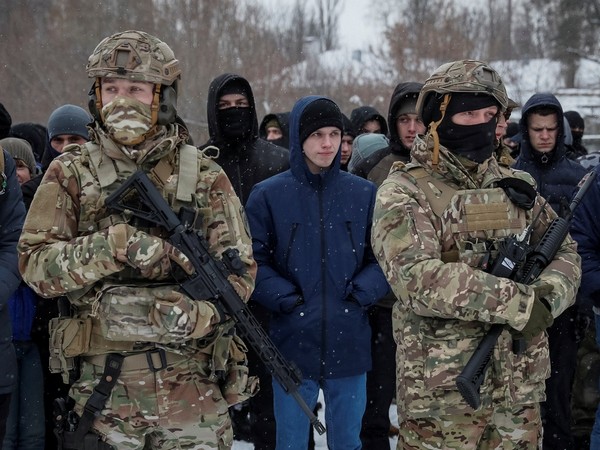

As Europe is spiraling towards its worst security crisis in decades, Turkish President Recep Tayyip Erdogan has declared that he will try to bring together soon Russian President Vladimir Putin and Ukrainian President Volodymyr Zelensky.
Turkey, however, could be walking a fine line because, if there is a Russian armed attack on Ukraine, it will be forced to take sides in the conflict and jeopardize its economic relations either with Moscow or Kyiv.
Erdogan had said that Turkey was ready to do whatever was necessary to avoid a war. He also expressed the hope that Russia would not launch an armed attack or occupy Ukraine, stressing that there was a need for dialogue with Russia to listen to its reasonable security concerns.
Speaking to reporters on January 18 Erdogan, who supports Kyiv’s NATO aspirations, said, “I don’t see Russia’s invasion of Ukraine as a realistic option because Ukraine is not an ordinary country. It is a powerful country.”
The Turkish President announced that he would visit Ukraine on February 3 and will also visit Moscow soon. A Turkish diplomat said last week that both Russia and Ukraine were open to Turkey playing a role in easing tension.
It should be noted that Moscow is unlikely to see Turkey as an honest broker, as Ankara has sold to the Ukrainian defense industry Bayraktar TB2 drones, which Kyiv used against pro-Russian forces in Donbas three months ago.
Last December, Putin criticized Ukraine for using the uncrewed aircraft and called upon Turkey to put pressure on Kyiv not to use the Turkish drones, which in 2020 played a key role in Azerbaijan’s victory over Armenia in the Nagorno-Karabakh conflict.
In a telephone call, Russian President Putin told Erdogan that Ankara was involved in a “provocative and destructive activity.” Furthermore, a Kremlin spokesman stressed that Turkey’s ongoing arms sales to Ukraine threatened to destabilize the region.
Although Ankara knew very well that it risked angering Moscow if it continued to supply the drones to the Ukrainian government, as it did in the last months, it must have felt that its military-technical cooperation with Kyiv was far more beneficial to it.
As Turkey was expelled by the United States from the F-35 joint strike fighter program, following Ankara’s purchase of the Russian S-400 air defense system, and as it has started building its own fighter plane, it found that it lacked the technology needed to manufacture the engine of the fighter.
So, last October, Turkey reached an agreement with Ukrainian engine company Motor Sich for the supply to the Turkish defense company Baykar with 30 turboprop engines to use in its Akinci strike drones.
According to press reports, back in 2019, the Ukrainian government bought Bayraktar drones for USD 69 million and a year later the Ukrainian defense minister and the CEO of the Turkish company that produces the Bayraktar — signed a memorandum to establish a joint training and maintenance center in Ukraine.
The technology transfers with Ukraine have helped Turkey’s defense industry to bypass, party at least, the US sanctions imposed on it following the purchase of the S-400 defense system, and at the same time, Ankara found in Ukraine an eager buyer of its military hardware.
This, of course, did not go down well in Moscow, which said that arms sales to Ukraine destabilize the region.
Turkey has a quite complex relationship with Russia- involving cooperation in some areas and competitive, even adversarial, relations in others. In the economic field, it relies on Russian natural gas for its industry and on the millions of Russian tourists visiting Turkey who bring much-needed hard currency.
In the geostrategic field, they support opposite sides in the war in Syria and Libya. However, in Syria Turkish and Russian troops carry out joint military patrols and ceasefire agreements, while Russia is building a nuclear plant in Akkuyu in Turkey.
It should be noted that Ankara had criticized Moscow’s 2014 annexation of Crimea and expressed support for Ukraine’s territorial integrity- angering the Russian government- but on other matters, Erdogan and Putin have similar views.
Erdogan’s offer to play the role of mediator in the standoff in Ukraine can be seen either as a genuine effort to prevent war between two countries with which Ankara has important relations or as Erdogan’s attempt to get international public attention and approval. But if war breaks out, Turkey will be one of the first countries to feel the fallout.
Sinan Ulgen of the Center for Economics and Foreign Policy Studies based in Istanbul says, “If there is talk of conflict, Turkey will come under pressure also to align itself with the sanctions policy firstly, and that would be a major dilemma. The second major dilemma would be on the ongoing relationship with Ukraine, in particular, whether Turkey will continue to supply armed drones or not. And there, there is very little neutral ground, in the sense that the answer can be only ‘yes’ or ‘no,’ and both would put Turkey firmly in one camp.”
A similar view was expressed by Fehim Tastekin, columnist of Turkey Pulse, who points out: “Even if Ankara manages to pull off an impartial position, Turkish-Russian ties could hardly emerge unscathed from this turbulence. It is hard to imagine that Putin will ignore Turkey’s sale of armed drones to Ukraine or Erdogan’s description of Crimea as a “usurped” territory…Putin’s capacity to bloody Turkey’s nose when he deems it in Russia’s interests is not in doubt.”